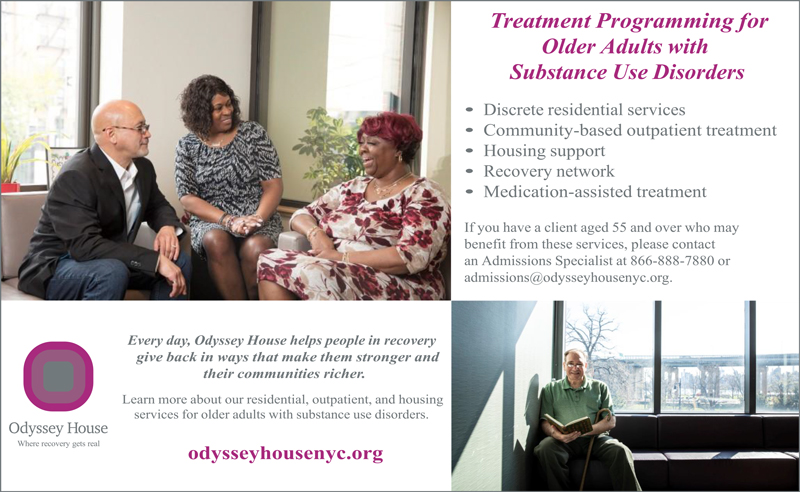As the leader of Odyssey House, one of the largest non-profit residential and outpatient treatment providers in New York City, I have witnessed firsthand the growing need for specialized services tailored to those struggling with addiction, including older adults. While substance use disorders can impact anyone regardless of age, this population faces unique challenges that traditional treatment programs often fail to address adequately.

According to the National Institute on Drug Abuse (latest data reported in 2018), an estimated one million older people in the United States have a substance use disorder. Still, they are less likely to seek treatment, even though they are just as likely to benefit from treatment as any other age group.
The failure of public health systems to identify a vulnerable and high-risk population was recently highlighted in an in-depth article by investigative journalists at the New York Times and a local Baltimore newspaper. Their investigation pieced together previously unpublished autopsy reports and other data to unearth a staggering overdose death rate among older black men in that city that is 20 times higher than the national average.
The article described this group as part of a “forgotten generation” that has been disproportionately impacted by successive waves of drug epidemics from heroin and crack cocaine to prescription opioids and now fentanyl.
While the data in the report is specific to Baltimore, the underlying factors, such as lack of economic opportunities, the crack epidemic, over-incarceration, and the current fentanyl crisis, have impacted many American cities, albeit not likely to the same devastating degree as Baltimore.
Breaking Down Barriers
What we have learned at Odyssey House in New York is that one of the biggest hurdles to reaching this at-risk population is the pervasive stigma surrounding addiction, especially for those who grew up in a generation where it was viewed as a moral failing rather than a treatable health condition. This internalized shame can lead to denial, attempts to hide substance use, and reluctance to be open with healthcare providers.
Older adults also face distinct physical and cognitive challenges. Their ability to metabolize substances – e.g., illicit drugs, alcohol, and prescription medications – is decreased due to aging, making them more sensitive to adverse effects. Chronic pain, cognitive impairment, and co-occurring mental health issues like depression are also more prevalent and can contribute to or be exacerbated by substance abuse. Proper medical care and mental health support are critical components of effective treatment for this population.
Also problematic is the lack of age-appropriate screening tools and limited research data on evidence-based treatment approaches specifically for older adults with substance use disorders.
Healthcare providers often fail to screen or misdiagnose substance use disorders within this population. More must be done to increase training and awareness.
Odyssey House’s Approach
At Odyssey House, we are committed to reducing stigma through education and offering judgment-free treatment tailored to clients’ needs. We have been addressing this unmet need through our older adult program, one of the only residential and outpatient treatment programs in New York designed specifically for men and women aged 55 and over struggling with addiction.
Over two decades ago, with seed money from the Mary and Milton B. Rosenback Foundation, a family foundation steered by our late Board Chair, George Rosenfeld, we developed a discrete service for older adults based on what we saw as their critical need for specialized treatment.
What began with a small cohort of similar-aged clients grouped on a floor of a treatment center is now a stand-alone 100-bed residential and outpatient program supported with ongoing funding from the New York State Office of Addiction Services and Supports.
Our comprehensive services include:
- Individualized treatment plans and lengths of stay
- Mature staff experienced in senior care
- Evidence-based therapies like CBT and trauma-informed care
- Medication-assisted treatment and on-site medical/dental clinics
- Age-appropriate physical fitness, art and recreational activities, education, job training
- Housing assistance and ongoing outpatient support.
Importantly, group therapy provides a stigma-free environment with a strong community focus. Many older adults have lived with addiction for decades while trying to hide it from family, friends, and co-workers. Having a supportive peer network is crucial for accountability and lasting recovery.
As the aging population continues to grow, so too will the need for specialized substance use treatment tailored to their unique circumstances. Odyssey House remains committed to innovative, evidence-based care that meets our clients where they are and helps them rebuild lives of purpose and dignity.
With increased awareness, training, and access to proper resources, we can ensure that no one is left behind on the road to recovery.
Peter Provet, PhD, is President of Odyssey House.








